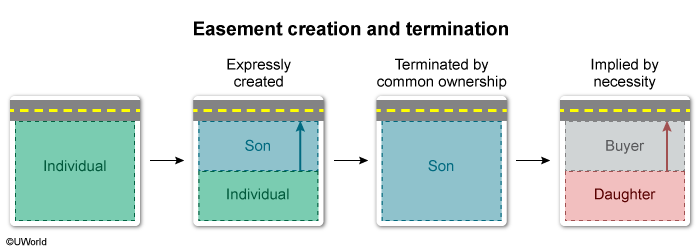An individual owned 20 acres of undeveloped land. She gave her son a 12-acre portion of the land. Because the remaining eight-acre parcel lacked any access to a public road, the deed, which was properly recorded, provided that she retained the right to construct a road across the larger parcel to access the public highway that ran adjacent to the larger parcel. Although she lived for another 15 years, neither she nor her son took any action with regard to their parcels, nor was there any change in the surrounding area. When she died, her son inherited all of her property.
Subsequently, the son sold the larger parcel to a buyer and gave the smaller parcel to his daughter. The daughter, intending to build a house on her parcel, has approached the buyer about building an access road across the buyer’s property to the house. The buyer, asserting that the daughter has no right to do so, has refused to discuss the matter with her.
Does the daughter have an easement across the buyer’s land to access her land?
A) No, because the individual could not reserve an easement for her own benefit. [0%]
B) No, because the merger of the two parcels through ownership terminated the individual's easement. [22%]
C) Yes, because an express easement is not terminated by nonuse. [11%]
D) Yes, because there is an easement by necessity. [66%]
Note: The percentage next to the answer indicates what percent of UWorld users selected that answer option.
Explanation

The individual gave her son a portion of her land and properly reserved an easement that allowed her to construct a road across his land to access a public highway (Choice A). That easement terminated when the dominant estate (individual’s 8-acre parcel) and servient estate (son’s 12-acre parcel) merged into the hands of a single owner after the son inherited all of the individual’s property. And that easement was not revived when the son later sold the 12-acre parcel to a buyer and gave the 8-acre parcel to his daughter.
However, an easement by necessity will be implied if all of the following elements are met:
- Necessity – the dominant (benefited) estate is virtually useless without an easement across the servient (burdened) estate
- Common ownership – the dominant and servient estates were under common ownership in the past (ie, they were once a single tract of land)
- Severance – the necessity arose when the land was severed and the dominant and servient estates were created
Here, the daughter’s 8-acre parcel is virtually useless without an easement over the 12-acre parcel because the 8-acre parcel is landlocked and has no access to a public road (necessity). The son previously owned both parcels (common ownership), and the 8-acre parcel was landlocked when he sold the 12-acre parcel to the buyer (severance). As a result, the daughter has an easement by necessity across the buyer’s land to access the public highway (Choice B).*
*That easement will continue until the necessity ends (eg, when an alternative means of access becomes available).
(Choice C) An express easement is not terminated by mere nonuse, so the individual’s easement was not terminated by her failure to create an access road across the 12-acre parcel. Instead, her easement was terminated by merger. Nevertheless, the daughter has an easement by necessity over the 12-acre parcel to reach the public highway.
Educational objective:
An easement by necessity is created when (1) the dominant estate is virtually useless (eg, landlocked) without the benefit of an easement across the servient estate, (2) the two estates were once a single tract of land, and (3) the necessity arose when the land was severed and the two estates were created.
References:
- Restatement (Third) of Property: Servitudes § 2.15 (Am. Law Inst. 2000) (easement by necessity).
- Restatement (Third) of Property: Servitudes § 7.5 (Am. Law Inst. 2000) (termination of easement by merger).

